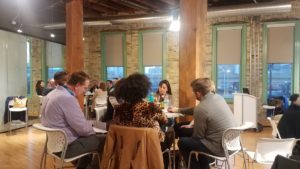Storytelling
 Collab Lab 26 focused on storytelling and how we can use those practices to empower student voices and drive engagement.
Collab Lab 26 focused on storytelling and how we can use those practices to empower student voices and drive engagement.
We started the discussion with the question “What hopes do you have when students are given a chance to tell stories that matter to them?”:
- Students will be able to share stories with an authentic audience
- Students will develop a sense of identity and worth
- Students will have the chance to understand a commonality of experience
- Students are able to advocate for their ideas
- Students capture history making connections
- The process models collaboration, community, and critical thinking
- Students understand the power of their voice, and empathy for others
- Students share and support authentic representation, identity, and learning
- Empathy – students see the ethical and therapeutic potential of seeing others as human
- Students gain a sense of freedom, choice, ownership, authenticity, bravery, and dignity from the stories they share
Authentic storytelling comes with risks, so we also asked about the fears participants had when students tell stories that are meaningful to them:
- We are not prepared to hear a story in a supportive way
- A lack of efficacy or ability to change lives
- If we don’t teach the art and science of storytelling, students will stop telling them– they need an audience
- No acceptance of failure (shame, exposure, sharing)
- Sensation of negative, leads to negative – e.g. if one student tells a story of harmful behavior does that lead others to emulate that behavior?
- It is difficult to combat the toxicity of Celebrity as Hero.
- Vulnerability of students (low initial stakes with incremental risk)
- Exposure of trauma without an ability to care for it
From there we moved on to ask “What questions can help students identify stories worth telling?” Here, the need to as these questions in an iterative, repetitive way was called out as a necessary step in getting students to think deeply about their responses. The goal for participants here is to help students find a story they can tell from the heart.
- Who are you?
- Where are you from?
- Why?
- For what and for whom?
- How can this story touch one person?
- How do you tell different stories to different people?
- What’s your reason – your personal mission statement?
- What is/are your:
- weirdness
- mutation
- zip code
- fears
- pains
- joys
- passions
Our final question asked participants what they need to help students tell these stories:
- To create a culture and community that supports students’ voices, and provides safety and comfort as they tell their stories
- To give students options about how to tell their stories
- To provide students a space that makes them feel awesome
- Time, flexibility, community, connections
- Access to storytelling expertise
- Time for students to play
- A culture of storytelling that recognizes the need for authentic listening, and receiving
- The opportunity to use non-linguistic media
- Imagination
Give the focus on storytelling, one of our discussion groups captured what this might look like as a story:
At MLK Elementary, a 6th grader who was sometimes seen as a troublemaker got up in a front of a room and told the story of how she realized she was a naturally gifted pool player. This resulted in lots of positive attention for her! The workshops and prep time she used paid off!
Resources
Milwaukee Film
Youth Education (for young people): https://mkefilm.org/for-
Educator Services: https://mkefilm.
UWM
Milwaukee Visionaries Project (MVP) UWM-sponsored after-school animation program serving middle and high school students from throughout the city of Milwaukee. Our programming for middle and high school students aligns with the MPS school year and we enroll students on a rolling basis throughout the year. MVP does not currently offer a summer session, but UWM’s greater Art Ed networking organization (ArtsECO) runs Pre-College Art and Design classes for high school students during our off-season.
Information for Pre-College programming available at UWM can be found here: https://uwm.edu/arts/
Geoconvos
Using place and identity as framework for storytelling as an https://geoconvos.org/
Have something to add that we didn’t catch here? Let us know.
Thanks!
Thanks again to The Commons for providing the space for this month’s Collab Lab. Thanks also to our featured participants:
Karen Ambrosh — Teacher, Audubon Technology and Communication High School
Emily Berens — Program Coordinator, UWM’s ArtsECO
Adam Carr
Wendy Harrop — STEM/Library Integrator, Summit Elementary School
Dominic Inouye — Founder and Director, ZIP MKE & Jane’s Walk
Megan McGee — Co-founder and Executive Director, Ex Fabula
Cara Ogburn — Programming & Education Director, Milwaukee Film

